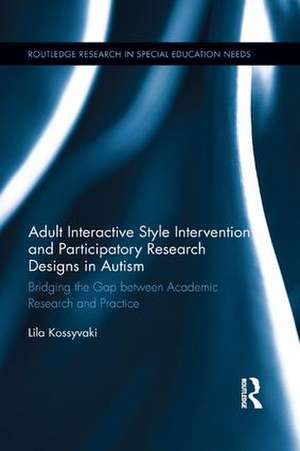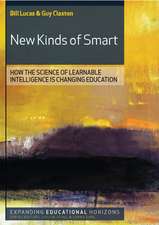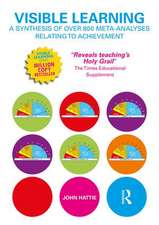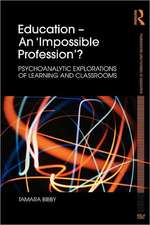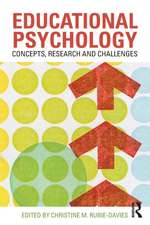Adult Interactive Style Intervention and Participatory Research Designs in Autism: Bridging the Gap between Academic Research and Practice: Routledge Research in Special Educational Needs
Autor Lila Kossyvakien Limba Engleză Paperback – 31 ian 2019
This book provides clear and detailed guidance on how to conduct research into autism in real-world settings such as schools and homes. Kossyvaki critically evaluates a wealth of relevant case studies and focuses on a number of methodological issues that researchers are likely to face when carrying out research of this complex nature. The author walks the reader through present literature on the importance of spontaneous communication and the atypical way that this tends to develop in autism, before bringing the results of her own research to bear on the question of how the interactive styles of neurotypical individuals can impact on the spontaneous communication of people with autism.
Adult Interactive Style Intervention and Participatory Research Designs in Autism is essential reading for academics, researchers, and postgraduate students in the fields of special educational needs, inclusion, autism, research methods, and educational and clinical psychology.
| Toate formatele și edițiile | Preț | Express |
|---|---|---|
| Paperback (1) | 375.56 lei 6-8 săpt. | |
| Taylor & Francis – 31 ian 2019 | 375.56 lei 6-8 săpt. | |
| Hardback (1) | 1158.84 lei 6-8 săpt. | |
| Taylor & Francis – 12 sep 2017 | 1158.84 lei 6-8 săpt. |
Preț: 375.56 lei
Preț vechi: 395.34 lei
-5% Nou
Puncte Express: 563
Preț estimativ în valută:
71.86€ • 75.30$ • 59.41£
71.86€ • 75.30$ • 59.41£
Carte tipărită la comandă
Livrare economică 11-25 aprilie
Preluare comenzi: 021 569.72.76
Specificații
ISBN-13: 9780367232757
ISBN-10: 0367232758
Pagini: 218
Ilustrații: 14 Tables, black and white; 4 Line drawings, black and white; 8 Halftones, black and white
Dimensiuni: 156 x 234 x 12 mm
Greutate: 0.28 kg
Ediția:1
Editura: Taylor & Francis
Colecția Routledge
Seria Routledge Research in Special Educational Needs
Locul publicării:Oxford, United Kingdom
ISBN-10: 0367232758
Pagini: 218
Ilustrații: 14 Tables, black and white; 4 Line drawings, black and white; 8 Halftones, black and white
Dimensiuni: 156 x 234 x 12 mm
Greutate: 0.28 kg
Ediția:1
Editura: Taylor & Francis
Colecția Routledge
Seria Routledge Research in Special Educational Needs
Locul publicării:Oxford, United Kingdom
Public țintă
Postgraduate and ProfessionalCuprins
Foreword 1. Introduction 2. Autism and Spontaneous Communication 3. Reviewing the Literature on Adult Interactive Style to Inform Practice 4. Adult Interactive Style at School and at Home 5. The Research Project 6. Analysing and Discussing the Findings 7. Participatory Research Designs: Implications for Practitioners and Parents 8. Participatory Research Designs: Implications for Research 9. Conclusions Appendix One Appendix Two
Notă biografică
Lila Kossyvaki is Lecturer in Severe Profound and Multiple Learning Difficulties at the University of Birmingham. She has conducted extensive research on how home- and school-based intervention can be used to promote social communication and play skills in children with autism and learning difficulties.
Recenzii
‘Bridging the gap between research and practice sounds easy but can be immensely challenging. In this thoughtful and accessible book, Lila Kossyvaki uses her personal experience to show how research can truly inform real world practice to benefit children with autism and a range of learning difficulties. This book will be of interest and utility to researchers, practitioners and parents alike.’ - David Preece, Associate Professor, University of Northampton, UK.
‘This book will contribute to the field of research into practice for autism and many other communication difficulties for many years. It is a treasure trove for anyone embarking on research in this field. The central premises of increasing the spontaneous initiatives of children along with the focus on the co-creation of new knowledge are important.’ - Hilary Kennedy, Educational Psychologist, Lead Developer of Video Interaction Guidance , Honorary Senior Lecturer, UCL, UK.
'Lila Kossyvaki’s Adult Interactive Style Interventions (AISI) is a timely reminder that if we’re going to teach children with autism how to communicate effectively, it takes two to talk. That is, that adults who are working with children who will by definition struggle with communication, must be aware not only that they hold the key, but how to use that key to unlock the potential riches. When one considers that the book also contains considerable, very well researched yet easy to read backgrounds and explanations of every autism intervention known to man, this becomes a must have book for teachers, support workers, therapists, carers, parents and researchers working in the field of autism.' – Peter Imray, Special Educational Needs Training and Advice, UK.
'Writing up research done for a PhD in a way that will appeal to more general readers is a real challenge. This book reflects the author’s passion to communicate the findings from her ground-breaking doctoral research in a way that is accessible and practically useful for a range of professionals. I hope that teachers and others are excited by the changes which Lila and the staff she worked with saw in the communication of some very hard to reach children, and inspired to try the methods she has developed for themselves. Lila has certainly provided all the information which anyone who wants to try out Adult Interactive Style Intervention for themselves will need. I thoroughly recommend this book to anyone who is concerned to increase the communication and social of children with learning difficulties and autism.' - Jean Ware, Reader in Education (Special Educational Needs), Bangor University, UK.
‘This book will contribute to the field of research into practice for autism and many other communication difficulties for many years. It is a treasure trove for anyone embarking on research in this field. The central premises of increasing the spontaneous initiatives of children along with the focus on the co-creation of new knowledge are important.’ - Hilary Kennedy, Educational Psychologist, Lead Developer of Video Interaction Guidance , Honorary Senior Lecturer, UCL, UK.
'Lila Kossyvaki’s Adult Interactive Style Interventions (AISI) is a timely reminder that if we’re going to teach children with autism how to communicate effectively, it takes two to talk. That is, that adults who are working with children who will by definition struggle with communication, must be aware not only that they hold the key, but how to use that key to unlock the potential riches. When one considers that the book also contains considerable, very well researched yet easy to read backgrounds and explanations of every autism intervention known to man, this becomes a must have book for teachers, support workers, therapists, carers, parents and researchers working in the field of autism.' – Peter Imray, Special Educational Needs Training and Advice, UK.
'Writing up research done for a PhD in a way that will appeal to more general readers is a real challenge. This book reflects the author’s passion to communicate the findings from her ground-breaking doctoral research in a way that is accessible and practically useful for a range of professionals. I hope that teachers and others are excited by the changes which Lila and the staff she worked with saw in the communication of some very hard to reach children, and inspired to try the methods she has developed for themselves. Lila has certainly provided all the information which anyone who wants to try out Adult Interactive Style Intervention for themselves will need. I thoroughly recommend this book to anyone who is concerned to increase the communication and social of children with learning difficulties and autism.' - Jean Ware, Reader in Education (Special Educational Needs), Bangor University, UK.
Descriere
Building on the author’s own cutting-edge research, Adult Interactive Style Intervention and Participatory Research Designs in Autism examines the impact that the interactive style of neurotypical individuals could have on the spontaneous communication of children with autism.
